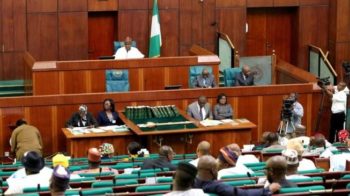
The House of Representatives on Tuesday moved to legalise the controversial Excess Crude Account by proposing a bill to capture all excess revenue in a new account to be called Excess Revenue Fund Account.
The bill, proposed by a member of the House, Lovette Idisi, passed second reading during Tuesday’s plenary.
The session was presided over by the Speaker, Yakubu Dogara.
The existing ECA is the account into which the Federal Government remits any crude oil revenue in excess of the budgeted crude oil benchmark for the current year.
The account has been a source of discord between the National Assembly and the Executive as well as state governments over the years.
However, the new House bill seeks to legalise the ECA by introducing the Excess Revenue Fund Account.
According to the proposal, no money shall be withdrawn from the Excess Revenue Fund Account except in the manner approved by the National Assembly.
The bill primarily seeks to amend Section 5 of the extant Allocation of Revenue (Federation Account, etc.) Act, Cap. A15, Laws of the Federation of Nigeria, 2004 by inserting a new Section 5A (1).
The proposal read in part, “There is hereby established for the federation an Excess Revenue Fund Account, which shall consist of all revenues or other money raised or received by the federation above the revenue targets set out for the purpose of funding the budget in a fiscal year…”
However, the funds in the ECA, being the assets of the three tiers of government, some members queried the essence of the new law transferring the power to legislate over it to the National Assembly.
They also sought to know whether another account outside the Federation Account recognised by the constitution could be created by a bill as against amending the constitution.
They argued that the National Assembly could not decide for the states and local governments how to spend their money by attempting to bring the ECA under its control or treat it as though it was the Consolidated Revenue Fund of the Federation owned solely by the Federal Government).
The Chairman, House Committee on Foreign Relations, Nnenna Elendu-Ukeje, analysed the implications of the bill and warned that it could raise conflicts.
She stated, “Well, I think that today’s bill put paid to the question that was troubling our minds on the last motion in the House regarding the $1bn deduction from the ECA for the counter-terrorism war.
“On that day, Mr. Speaker and the Leader of the House, Femi Gbajabiamila, at the time, we had said that it was an illegal account. Of course, they differed on that day that it was an illegal account.
“In fact, Gbajabiamila said that $1bn was part of the contribution of the states. But, in his debate today (Tuesday), he said that it was an account that was shrouded in so much mystery, where nobody knew what was accruable to the states and what was accruable to the Federal Government.
“So, as far as I am concerned, if we are seeking to give it legal backing, what it means is that everything the account has up to date, has operated illegally.
“As a matter of fact, in Gbajabiamila’s debate, he said that somebody should change the word, ‘establishment’, because the ECA has not been established, that the National Assembly is the only body that has the power to come up with an establishment bill, which means that we have been operating an illegal account. Therefore, my concern is the constitutionality of it all.”